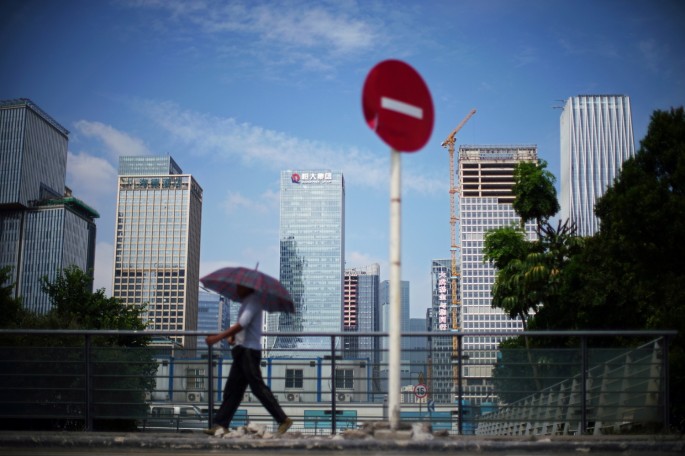China Evergrande Group offshore bondholders are concerned that it is close to defaulting on debt payments and want more information and transparency from the cash-strapped property developer, their advisers said.
Evergrande, which could trigger one of China's largest defaults https://www.reuters.com/article/china-evergrande-debt-property-bonds/update-1-building-default-fears-pummel-chinese-property-firms-idUSL8N2R433Z as it wrestles with debts of more than $300 billion and whose troubles have already sent shockwaves across global markets, missed payments on dollar bonds, worth a combined $131 million, that were due on Sept. 23 and Sept. 29.
With Evergrande staying silent on dollar debt payments and prioritising onshore creditors, offshore investors https://www.reuters.com/business/investors-grappling-with-evergrande-fallout-weigh-risk-wider-pain-2021-09-20 have been left wondering if they will face large losses at the end of 30-day grace periods for last month's coupons. [nL8N2QP1H5]
A group of bondholders have enlisted investment bank Moelis & Co and law firm Kirkland & Ellis to advise them.
Offshore bondholders want to engage "constructively" with the company, but are concerned about lack of information from what was once China's top-selling property developer, said Bert Grisel, a Hong Kong-based managing director at Moelis.
"We all feel that an imminent default on the offshore bonds is or will occur in a short period of time," Grisel said on a call with bondholders on Friday.
"Unfortunately, so far, we have had a couple of calls with the advisers," but there had not been any "meaningful dialogue with the company or provision of information", he said
Evergrande, which faces nearly $150 million in offshore payment obligations next week, did not respond to a Reuters request for comment.
Neil McDonald, a restructuring partner in the Hong Kong office of Kirkland & Ellis, said the bondholders would like more transparency, and hoped Evergrande would meet disclosure obligations under stock listing rules.
The offshore bondholders are also demanding more information about Evergrande's plan to divest some businesses and how the proceeds would be used, the advisers said, adding that the creditors group they represent was growing.
The two advisers said that, including the parties that have expressed an interest to be part of the group, they represent bondholders who currently hold $5 billion worth of Evergrande nominal offshore bonds.
Evergrande said last month it would sell a $1.5-billion stake it owns in Shengjing Bank https://www.reuters.com/world/china/china-evergrande-transfer-15-bln-stake-shengjing-bank-state-firm-2021-09-29 Co Ltd. The bank, one of Evergrande's main lenders, demanded cash from the sale go towards settling the developer's debts with Shengjing.
Trading in Evergrande shares has been halted since Monday pending a major deal announcement. Trading in its Evergrande Property Services Group unit was also halted.
China's state-backed Global Times https://www.reuters.com/business/china-evergrande-share-trading-halted-hong-kong-2021-10-04 said Hopson Development was to acquire a 51% stake in Evergrande Property for more than HK$40 billion ($5.1 billion), citing other media reports.
"Whilst we don't want to overstate this, we are obviously at this point in time preparing contingency plans to ensure that there are no dissipation of assets," McDonald said.
"And if there is such activity, we will be prepared to take steps to protect the rights and interests of U.S. creditors, and we really hope that that's not necessary," he added.
The advisers for offshore Evergrande bondholders had reached the developer on Sept. 16, but had not received any assurance from the developer, demanding more transparency.
SECTOR SLUMP
In another development, Evergrande dollar-bond trustee Citi has hired law firm Mayer Brown as counsel, a source familiar with the matter, who declined to be named due to the sensitivity of the matter, told Reuters earlier on Friday.
Citi and Mayer Brown declined to comment.
The possible collapse of one of China's biggest borrowers has triggered worries about contagion risks in the world's second-largest economy, with other debt-laden property firms hit by rating downgrades on looming defaults.
With few clues as to how local regulators propose to contain the contagion from Evergrande, the price of bonds and shares in Chinese property developers slumped again on Friday.
"The potential lack of transparency and clarity are leaving investors more skittish and it will be very difficult for people to want to refinance any debt coming due in that particular sector," said Cliff Corso, chief investment officer of Advisors Asset Management.
An index tracking China's property sector dropped 1.53%, against a 1.31% blue-chip share rise.
The Shanghai Stock Exchange on Friday suspended trading of two bonds issued by smaller developer Fantasia Group China Co, with one dropping more than 50%, after controlling shareholder Fantasia Holdings Group missed the deadline on a $206 million international market debt payment on Monday.
Fantasia Holding said in a stock exchange filing on Friday that it had appointed Houlihan Lokey and Sidley Austin as its advisers to assess its capital structure, evaluate liquidity and explore solutions to ease its current liquidity issue.
Most of Evergrande and Fantasia's bonds have already lost around 80% of their value.
Meanwhile, bonds issued by Greenland Holdings, which has built some of the world's tallest residential towers including in Sydney, London, New York and Los Angeles, and Kaisa Group both took another beating on Friday. [L8N2R433Z].
"Market participants are questioning if this may be a precursor for voluntary defaults by other developers with healthy short-term liquidity positions, but large unsustainable longer-term debt," Chang Wei Liang, Credit & FX Strategist at DBS Bank, said in a note.



























